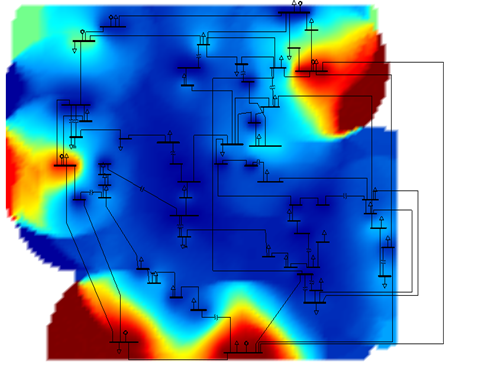Choosing PSO under Different Overloads to Provide Best Power Flow for IEEE - 57 Bus
DOI:
https://doi.org/10.58564/IJSER.2.3.2023.88Keywords:
Optimal Power Flow; Real Power Loss; PSO, Power Loss Minimization; Overload; IEEE-57 busAbstract
This study investigates the impact of Particle Swarm Optimization (PSO) on power loss and production cost reduction in overloaded transmission lines. PSO is used to manage power flow in congested transmission lines and reduce power losses. The proposed technique was tested using the IEEE large-scale 57-bus test system. Optimal power flow (OPF) is crucial for modern power systems, aiming to minimize active and reactive power distribution while considering technological and economic constraints. PSO is presented as a solution to the OPF problem, focusing on actual power losses, hypothetical power losses, and overload consequence. PSO is presents.as a solution, and various methods, such as genetic algorithms and linear programming, will be used to compare PSO results. The suggested PSO yields reduced power losses with higher loads in case studies. The approach is evaluated for IEEE -57 buses and produces superior results when used with the MATLAB environment. PSO reduces the target function's real power loss from its starting condition (24.98) MW to its ideal state (16.75) MW with a reduction of 8.23 MW. Additionally, PSO reduces the target function's active power loss by 20% overload from its initial state (56.042 MW) to the optimal state of 46.23 MW with a reduction of 9.812 MW.
References
F. M. Tuaimah and M. F. Meteb, “A Particle Swarm Optimization based Optimal Power Flow Problem for Iraqi Extra High Voltage Grid,” Int. J. Comput. Appl., vol. 59, no. 8, 2012. DOI: https://doi.org/10.5120/9568-4038
G. Chen, X. Yi, Z. Zhang, and H. Lei, “Solving the multi-objective optimal power flow problem using the multi-objective firefly algorithm with a constraints-prior Pareto-domination approach,” Energies, vol. 11, no. 12, p. 3438, 2018. DOI: https://doi.org/10.3390/en11123438
H. Rudnick, “Pioneering electricity reform in South America,” IEEE Spectr., vol. 33, no. 8, pp. 38–44, 1996. DOI: https://doi.org/10.1109/6.511739
E. Acha, H. Ambriz-Perez, and C. R. Fuerte-Esquivel, “Advanced transformer control modeling in an optimal power flow using Newton’s method,” IEEE Trans. power Syst., vol. 15, no. 1, pp. 290–298, 2000. DOI: https://doi.org/10.1109/59.852135
R. Singh, A. K.Verma, , and S. P. Singh, Optimal power flow under overloads for IEEE 57-bus system using opposition-based PSO algorithm. International Journal of Electrical Power & Energy Systems, vol.120, pp.106001, 2020.
M. H. Ibrahim, M. A.Shafee, and M. S.Ab-Rahman, Economic load dispatch with optimal power flow in a deregulated power system. Indonesian Journal of Electrical Engineering and Computer Science, vol. 17, no.2, pp.938-946, 2020.
T. H. Nguyen, and V. H. Do, Multi-objective optimal power flow considering voltage stability index for IEEE 57-bus system. Electric Power Systems Research, vol.189, pp.107130, 2021.
S. S. Rao, Engineering optimization: theory and practice. John Wiley & Sons, 2019. DOI: https://doi.org/10.1002/9781119454816
F. M.Tuaimah, Y. Nadhum Abd, and F. A. Hameed, “Ant Colony Optimization based Optimal Power Flow Analysis for the Iraqi
Super High Voltage Grid,” Int. J. Comput. Appl., vol. 67, no. 11, pp. 13–18, 2013. DOI: https://doi.org/10.5120/11438-6700
John J. Grainger, William D. Stevenson," Power System Analysis", McGraw Hill Inc., 1994.
X. Wang, X. Li, and X. Zhu. Optimal power flow considering load uncertainties and wind power integration using multi-objective differential evolution algorithm. International Journal of Electrical Power & Energy Systems, vol.133, pp.106831, 2021.
L. Al-Bahrani and V. Dumbrava, “Optimal power flow based on particle swarm optimization,” Univ. Politeh. Bucharest Sci. Bull. Ser. C-Electrical Eng. Comput. Sci., vol. 78, pp. 253–264, 2016.
M. A. Shahzad, M. F. Malik, and M. W. Ashraf, A modified particle swarm optimization algorithm for optimal power flow under contingencies. Energy, vol.235, pp.121168, 2021.
Layth Tawfeeq Al-Bahran and Ali Qasim Abdul Rasool "Multi-Objective Functions of Constraint Optimal Power Flow Based on Modified Ant Colony System Optimization Technique" IOP. Conference Series: Material Science Engineering, Vol. 1105, 2015 DOI: https://doi.org/10.1088/1757-899X/1105/1/012015
Layth AL-Bahrani and Virgil Dumbrava "Optimal Power Flow Based On Particle Swarm Optimization" U.P.B. Sci. Bull., Series C, Vol. 78, No. 3, 2016.
M. Ş. Üney, H. Çimen, N. Çetinkaya, and M. L. Levent, “Optimal Power Flow and Load Flow Analysis with Considering Different DG Integration Rates,” vol. 1, no. 9, pp. 542–549, 2017.
J. Kennedy and R. Eberhart, “Particle swarm optimization,” in Proceedings of ICNN’95 - International Conference on Neural
Networks, vol. 4, pp. 1942–1948. doi: 10.1109/ICNN.1995.488968. DOI: https://doi.org/10.1109/ICNN.1995.488968
Z. Deng, M. D. Rotaru, and J. K. Sykulski, “A study of evolutionary-based optimal power flow techniques,” in 2016 51st International Universities Power Engineering Conference (UPEC), 2016, pp. 1–6. DOI: https://doi.org/10.1109/UPEC.2016.8114071
B. Zhao, C. X. Guo, and Y. J. Cao, “An improved particle swarm optimization algorithm for optimal reactive power dispatch,” in IEEE Power Engineering Society General Meeting, 2005, 2005, pp. 272–279.
D. Darquennes, “Implementation and applications of ant colony algorithms,” Fac. Univ. Notre-Dame la Paix, Namur Inst. d’Informatique, vol. 40, 2005.
W. Ongsakul, D. N. Vo, "Artificial Intelligence in Power System Optimization", Taylor & Francis Group, 2013.
. Saraswat, A., Saini, A.: Multi-objective optimal reactive power dispatch considering voltage stability in power systems using HFMOEA. Eng. Appl. Artif. Intell. (EAAI) 26(1), 390–404(2013) DOI: https://doi.org/10.1016/j.engappai.2012.06.008
M. Varadarajan, K.S. Swarup, "Differential evolutionary algorithm for optimal reactive power dispatch", Elsevier, Electrical Power Systems Research, Vol.30, pp. 435- 441, 2008. DOI: https://doi.org/10.1016/j.ijepes.2008.03.003
P. Sharma and N. Batish, “Computational Analysis of IEEE 57 Bus System Using NR Method,” Int. J. Adv. Res. Electr. Electron. Instrum. Eng., vol. 4, no. 11, 2015, 4.11
R. Anand and V. Balaji, “Power flow analysis of simulink IEEE 57 bus test system model using PSAT,” Indian J. Sci. Technol., vol. 8, no. 23, p. 1, 2015, 8.23:1 DOI: https://doi.org/10.17485/ijst/2015/v8i23/79266

Downloads
Published
How to Cite
Issue
Section
License
Copyright (c) 2023 Ihsan Neamah Issa , Ali Abdul Razzaq Altahir, Firas Mohammed Tuaimah

This work is licensed under a Creative Commons Attribution-NonCommercial-NoDerivatives 4.0 International License.
Deprecated: json_decode(): Passing null to parameter #1 ($json) of type string is deprecated in /var/www/vhosts/ijser.aliraqia.edu.iq/httpdocs/plugins/generic/citations/CitationsPlugin.inc.php on line 49









